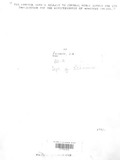| dc.description.abstract | In this paper, the role of the money multiplier in the process of money supply control
is explored. some hypotheses concerning the determinants of the behaviour of the
non-bank public and the banking sector are discussed.
Empirical analysis based on a model of two equations that try to explain the behaviour
of banks and the public is carried out. Annual secondary data for the period 1972-90
is used. Findings obtained indicate that to a certain extent, the behaviour of the non-
bank public and the banking sector can be made. Results obtained also indicate that
further research into the explanatory variables is still called for particularly as it relates
to the indices used as proxies to represent such variables.
The paper is organised into five chapters. Chapter one deals with background and
introductory remarks and includes th8"st~me.nt of the problem, objectives of the
study and its justification. Chapter 2, surveys the literature related to the subject;
chapter 3 gives the theoretical framework and the model specification. Chapter 4
analyses the results obtained in light of the hypotheses stated. And chapter 5 gives
the summary, conclusion and policy implications. | en |

